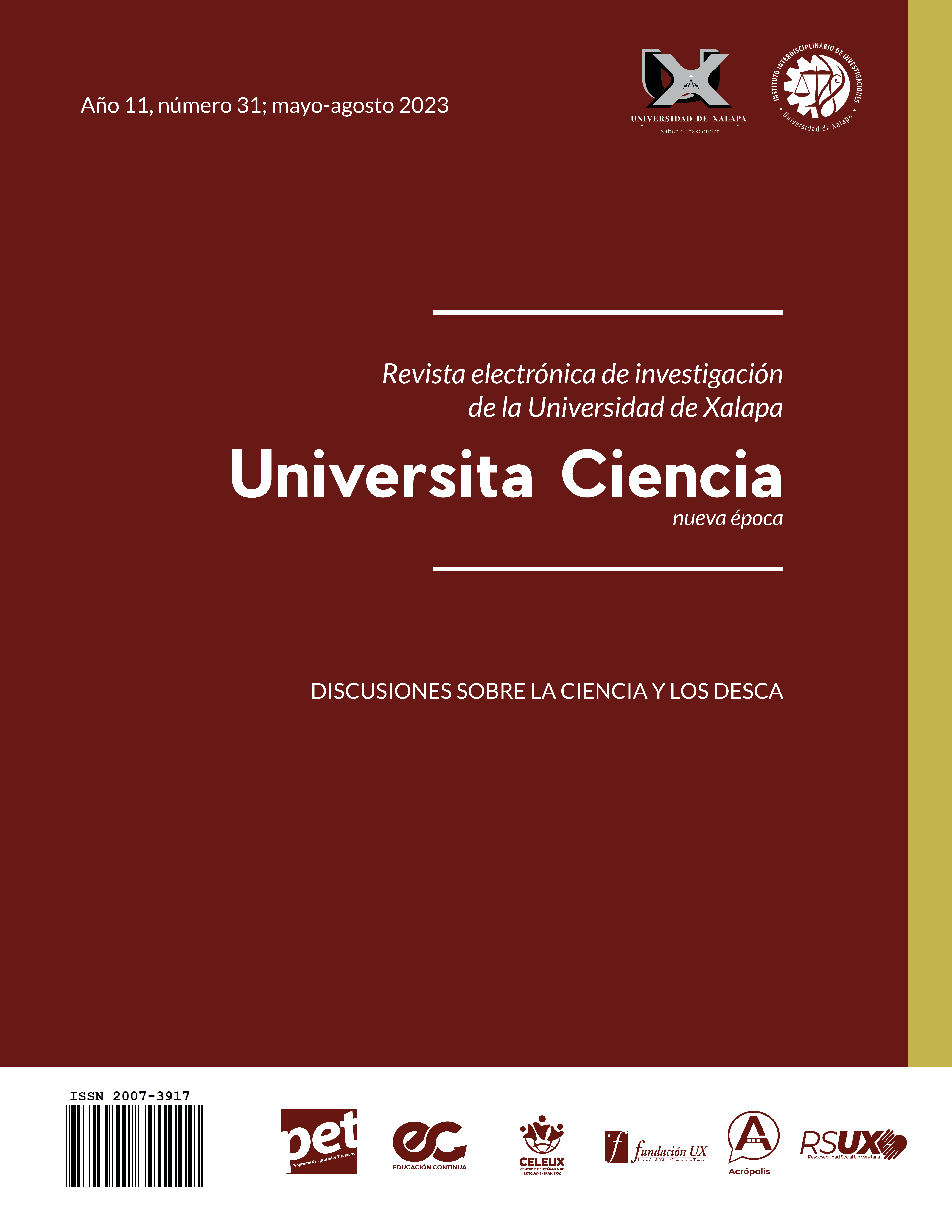Los derechos económicos, sociales, culturales y ambientales, un vehículo para combatir el fenómeno de la corrupción en México
DOI:
https://doi.org/10.5281/zenodo.8264173Palabras clave:
Derechos humanos, DESCA, Corrupción, Valores, TransparenciaResumen
Los derechos económicos, sociales, culturales y ambientales (DESCA) nacen de la necesidad de extender la influencia de los derechos humanos en la vida de las naciones para conseguir un planeta digno, al mismo tiempo que fortalece las capacidades del individuo para prevalecer en una sociedad protectora de sus derechos fundamentales. Este análisis cualitativo descriptivo permite observar el fenómeno multidimensional que afecta a la sociedad: la corrupción, y el impacto de los DESCA en el combate para erradicarla. Los resultados muestran que combatir al fenómeno de la corrupción demanda atención desde diferentes niveles sistémicos. Los valores emanados de los DESCA promueven el nacimiento de sociedades equilibradas y sanas, y establecen una estrategia para atenuar el impacto de la corrupción en la comunidad internacional. Los DESCA fomentan el respeto y la protección de los derechos fundamentales de los individuos y, por tanto, resultan elementales para combatir la corrupción.
Métricas
Citas
Bello, A. (2019). Combate a la Corrupción a partir de estrategias de gobierno abierto en Veracruz. Universita Ciencia, 8(22), 172-190.
Bello, A. (2022). El derecho a la información como impulsor del derecho fundamental a la buena administración pública. Universita Ciencia, 10(28), 175-188.
Comisión Nacional de los Derechos Humanos (2015). ¿Sabías que estos también son tus derechos? Derechos económicos, sociales, culturales y ambientales (DESCA). CNDH México.
Corruption Perceptions Index. (2023). Transparency International the global coalition against corruption. Transparency International.
Cruz, J., Rodríguez, P. y Larrañaga, P. (2019). Derechos económicos: una aproximación conceptual. Organización de las Naciones Unidas.
Fonseca, R. (2020). El derecho fundamental a una sociedad libre de corrupción: Una contribución desde Latinoamérica. Derechos y Libertades, 44(2), 237-275.
Global Peace Index (2022). Measuring peace in a complex world. Institute for Economics & Peace. Editorial IEP.
Hernández, A. (2022). El derecho humano al buen gobierno y el combate a la corrupción. Revista Dignitas, 15(44), 73-98.
Human Development Report. (2022). Uncertain times, Unsettled lives: Shaping our future in a Transforming World. United Nations Development Program. Editorial UNDP.
Kim, A. (2023). 2023 Index of Economic Freedom. The Heritage Foundation.
Piña, H., Uribe, E. y Flores, A. (2021). El derecho fundamental al desarrollo social libre de corrupción. Boletín Mexicano de Derecho Comparado 54(2), 210-237.
Rodríguez, T. (2022). La igualdad social y medioambiental como principios de la justicia: reflexiones filosóficas. Universita Ciencia 10(27), 111-122.
Suprema Corte de Justicia de la Nación. (2021). Derechos económicos, sociales, culturales y ambientales. https://www.scjn.gob.mx/derechos-humanos/sites/default/files/capacitaciones/archivos/2021-06/Temario%20DESCA%20VF%20Micrositio.pdf
Tello, L. (2015). Panorama general de los DESCA en el derecho internacional de los derechos humanos. Colección CNDH. Colección de textos sobre Derechos Humanos.
Vázquez, D., Cardona, L. y Ortiz, H. (2018). Los derechos humanos y la corrupción en México. Análisis de las tendencias en las entidades federativas entre el 2000 y el 2014. Comisión Nacional de los Derechos Humanos.
Zendejas, R. (2023). El gobierno abierto y el gobierno electrónico como factores que inciden favorablemente en el combate a la corrupción en México. Universita Ciencia, 11(30), 61-78.
Publicado
Cómo citar
Número
Sección
Licencia

Esta obra está bajo una licencia internacional Creative Commons Atribución-NoComercial-CompartirIgual 4.0.
Esta revista adhiere a la licencia Creative Commons en la definición de su política de acceso abierto y reúso del material publicado, en los términos siguientes:
- Accesibilidad a los artículos y demás publicaciones de manera total o parcial bajo el concepto de copia, distribución, comunicación pública, acceso interactivo (por internet u otros medios), manteniendo de manera explícita el reconocimiento al autor o autores y a la propia revista (reconocimiento de autoría).
- Advertencia de que si se remezcla, modifican los artículos o se emplean fragmentos en otras creaciones, no se puede distribuir el material modificado, ni tampoco se permite reconstruir versiones a partir de los artículos originales publicados (obras derivadas).
- Se prohíbe el uso de contenidos de los artículos publicados, total o parcialmente, con fines lucrativos (reconocimiento no comercial).
El autor conserva los derechos de autor, transfiere u otorga derechos comerciales exclusivos al editor, y se utiliza una licencia no comercial.














